For many folks who are eager to escape the rat race and get back to a simpler, purer form of living, escaping to a homestead of any size sounds like a dream, but it is nonetheless possible.
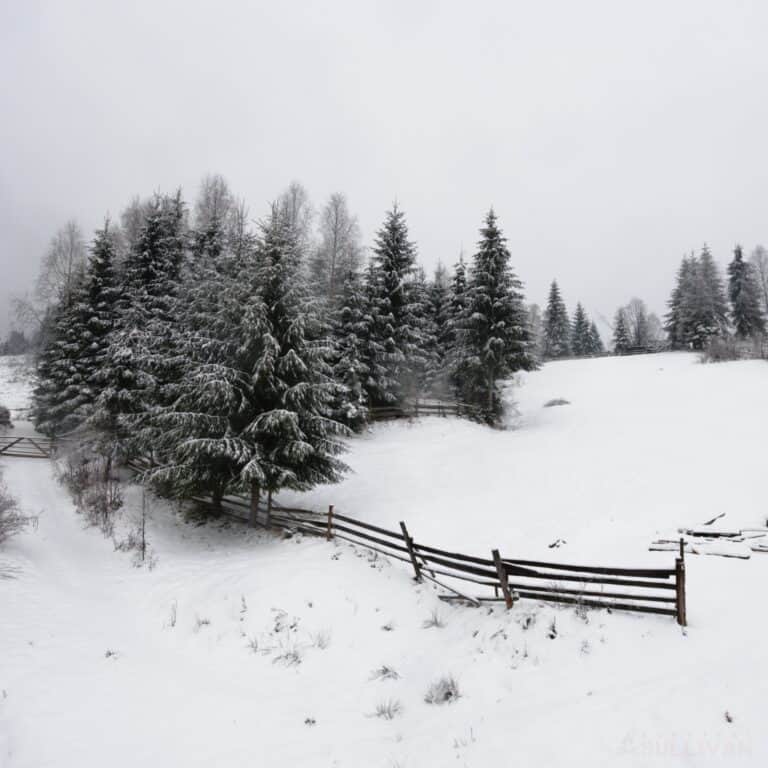
Living on and running a working, sustainable homestead is hard work, but it is much closer to the model of typical human existence throughout the ages than the bug-like lives inflicted on urban dwellers. For preppers, obtaining a homestead of their own is seen as something of a bucket list item and a crown jewel prep.
What could be better than leaving behind all of the risk and dependency that comes bundled with civilization to instead make your stand and live your life on a self-sufficient homestead? Well, as it turns out just because you have made it to the homestead does not mean you can claim that you won’t have any trouble.
In fact, many of the same disasters you are preparing for in the city or in the suburbs can still befall you on your homestead, and the lifestyle attendant with living and managing your homestead means you’ll be exposed to entirely new risks and dangers.
I’m not trying to dissuade you, but you’ll need to be prepared for various emergencies even while you are doing the Green Acres thing. In this article, we’ll be talking about 10 common ones you must be ready for.
No Cavalry Coming
Generally speaking, living on a homestead means you have made the choice to be less dependent on society.
This does not mean you won’t partake of what society can offer or that you won’t be able to take advantage of emergency services and things like that, but the remoteness of your average homestead means that you often won’t be able to summon help from “official” sources in a timely fashion.
If things get really bad in major population centers, help likely won’t show up at all…
This means that you are on your own, literally and figuratively. Any problem that befalls you is one that you must be able to solve, and some problems are so big all you can do is hope to prepare and harden yourselves and your property against them ahead of time.
Choosing to live on a homestead is choosing “hard mode”: Unless you grew up on a working farm or living in extremely austere conditions you’ll be forced to become even more competent in even more skill sets if you want to remain safe and sound.
On that note, your “first responders”, aside from you and your family, will most likely be your neighbors- fellow homesteaders, farmers, even the occasional deep woods hermit.
This lifestyle is one where you must be able to depend on your neighbors, and they must know that they can depend on you in return. These are the bonds that real community is forged from, and though they take time to craft they are an essential building block for a homesteader lifestyle.
Ponder that while you read through the emergencies and action items in the next section.
Bulletproof Your Homestead for These Emergencies
Power Outage
- Risk Factors: Loss of productivity, loss of some food preservation (fridge, freezer, etc.)
- Solution: Implement power production (generator, solar, wind, etc.) and power storage systems (battery banks, “whole house” battery)
Even if you live on a homestead in modern times, chances are good that you are still dependent on electricity, and that electricity probably comes from the electrical grid, same as everybody else. From lighting to running or charging electrical tools, it is hard to imagine getting by without electricity in any working environment.
That is why you must be prepared for the loss of power on your homestead. You’ll still need lights to work by, tools will still need to be run and you definitely need to keep your refrigerator and freezer going, if you have them.
Preparing to deal with the loss of primary power on the homestead usually consists of a two-pronged approach: Generating or storing your own electricity, and implementing procedural or lifestyle changes that do not depend on electricity.
Regarding the first, having a sizable generator, maintained and kept on standby, can likely supply all the electricity a modestly sized homestead needs. Generators are noisy, require periodic maintenance, and obviously require plenty of fuel to run, so these are other considerations that must be accounted for.
Alternatively, a small solar power “farm” and “whole house” battery system utilizing deep cycle batteries will allow life to continue normally for a time- so long as the power will be restored to recharge it later!
Injury / Illness
- Risk Factors: Loss of productivity, deteriorating or life-threatening condition.
- Solution: Use best practices to reduce the chance of injury, learn basic first-aid and trauma care, make friends with local doctors/nurses/vets as a contingency plan.
Working on your homestead is not going to be like a safe, cushy, and comfortable (if soul-crushing) cubicle job. There will be lots to do, and much of it will be hard work.
Whether you’re working with manual or hand tools, tending to your garden or to a large plot of land, or dealing with one of the many species of livestock that populate a homestead there will be ample opportunity for injury.
But if you get hurt, especially in the middle of an SHTF situation, you won’t be able to run into town to the emergency room, the clinic or your family doctor’s office. In fact, higher level medical care might be entirely non-existent depending on the circumstances.
Any injury that keeps you from working is going to be a showstopper, and when you live on a homestead if you can’t work the land and take care of the innumerable daily tasks (that won’t wait for attention) you are basically on a sinking ship.
Crops, animals and basic life support tasks are all depending on you and your family members or group being able to put in the work, day in and day out, no matter what.
This is scary stuff: Someone will have to pick up the slack, and if they can’t do it then you are genuinely out of luck. To prevent this unhappy occurrence, you’ll need to truly become your own first responder and have at least a functional knowledge of essential first-aid and basic trauma care.
If you can’t do it, someone in your family or group must know how or you had better make friends with a doctor, nurse, or veterinarian in your neck of the woods if you are lucky enough to count them as a neighbor.
Flooding
- Risk Factors: Death, Destruction of home and possessions, total loss of crops, loss of livestock, displacement.
- Solution: Carefully choose or site homestead in an area with minimal flood risk, prepare property for minor flooding with dikes and channels to improve drainage, and protect against imminent flooding by filling sandbags or hydro-dams, or building dirt berms with heavy equipment.
Flooding is one of the most common, most destructive, and most dangerous disasters that can occur. Anywhere on Earth that it can rain, it can flood, and your chances of enduring a destructive flood event grow exponentially if you are near a river or in a low-lying area.
When the water starts rising you have nowhere to go but “away” and “up”, and since your entire life is situated on and around your homestead it can be a grueling choice whether to leave it all and flee for your lives or stay and do what you can.
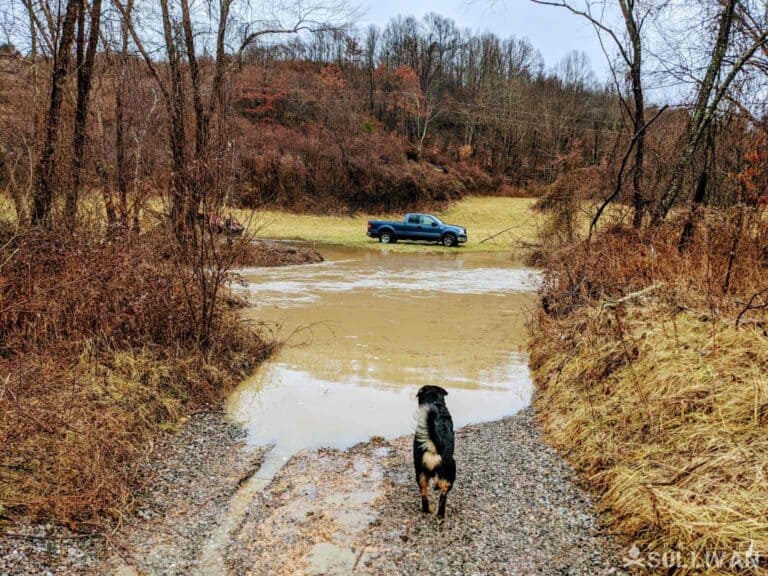
However, there is much you can do to insulate yourself, your homestead, and your holdings against the destructive power of a flood.
The first step is to carefully, and after much analysis, site or purchase your homestead in an area that is not prone to flooding. But more than this, with the right equipment and some serious effort it is actually possible to protect your home and other structures from rising flood water.
The first and most basic method is to ensure excellent drainage on your property, but good drainage will only be able to deal with a comparatively minor amount of water from a heavy downpour or very minor flood event.
It is possible to construct dikes around your property to protect it from rising water, and if you have access to heavy equipment you might even be able to pull it off ahead of an impending flood event in the form of simple, earthen berms.
It sounds crazy, but it has been done successfully before. The filling and piling of sandbags, though extremely laborious, is another viable flood protection method.
Another option that is increasingly viable is a hydro-dam: huge, cylindrical rubber containers that stand several feet tall when filled with water and have the mass to resist the force of moving flood water.
All of these options require investment and a significant amount of effort to emplace, but your home, crops and animals could all be on the line when a major flood occurs.
Aside from attempting to protect your property, it is time to prioritize what items and animals you can save and which ones you’ll have to sacrifice. Anything that is extremely important for your continued survival can be moved to higher ground, or at least off of low shelves and ground-level storage.
Animals can potentially be rounded up and herded or transported to high ground nearby, or perhaps you can take them to a sympathetic neighbor’s property if theirs won’t be affected by the flooding.
Tornado / Hurricane / Damaging Wind Event
- Risk Factors: Death, total destruction of property, high chance of damage to property, loss of crops, loss of livestock.
- Solutions: Install/Convert “tornado” shelter, build structures with high-strength fasteners, install storm shutters on windows.
Tornadoes, hurricanes, and other powerful storm events all have one thing in common: they can produce destructively high winds.
You don’t need me to explain to you how devastating these weather events can be, and a direct- or near-hit from a tornado, the passage of a major hurricane, or even a freak event like a wind shear or downburst can flatten your homestead, knock down fences, and kill or injure your animals or you.
There is not much you can do against such colossal power in case of a close call, but you can hedge your bets in other instances.
In case of a tornado or the high winds produced by a powerful hurricane, your number one priority is to get yourself and your family into shelter, preferably one below ground. If possible, and if you can do so safely, get your animals into shelter also.
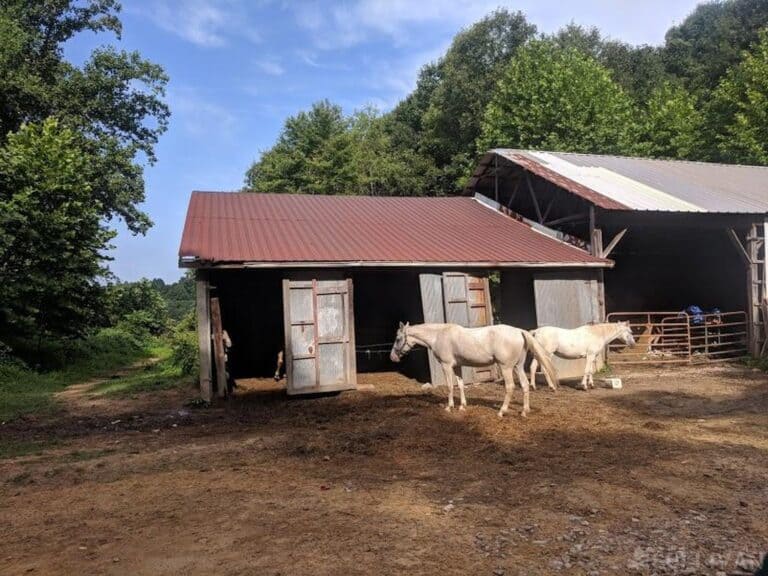
However, you can give yourself a leg up against these powerful wind storms by constructing your home and all outbuildings, barns, and similar structures using high-grade fasteners which will better resist the stresses of the titanic forces impacting them.
Installing modern or traditional heavy-duty shutters on your windows can also help protect the interior of your home from glass and flying debris. Storm shutters are still a thing y’all!
Blizzard
- Risk Factors: Loss of crops, loss of livestock, travel dangerous or impossible, loss of productivity, major danger of exposure.
- Solution: Stockpile food, water, medicine for humans and livestock, provide adequate shelter for animals, maintain surplus of fuel for heating systems. Consider a snow-capable vehicle if in blizzard-prone areas.
Blizzards are one natural disaster that can be as devastating as any other, but because they usually aren’t as spectacular as tornadoes, hurricanes, and other catastrophes they rarely get the coverage or attention that they deserve among preppers.
All you need to know is that a blizzard can dump tons of snow over a wide area while subjecting it to bitter, freezing cold.
To make matters worse they often have high winds accompanying them. The combination of freezing or sub-zero temperatures and tremendous snowfall will lead to primary and secondary effects that will put your survival skills to the test.
First, travel and even moving around outside will be made extremely difficult and dangerous, potentially impossible.
On a working homestead, weather this severe is likely to hinder or destroy crops and will place most breeds of livestock in mortal jeopardy unless they are appropriately sheltered.
However, now you’ll be dealing with freezing water and a lack of access to food for them, which will necessitate, you guessed it, you having to work even harder to take care of them.
You must have a ready supply of food, water, and all other necessities on hand not just for yourselves but for your livestock, if you have any.
Blizzards are notorious for completely shutting down travel in and around the affected area, and in case of genuine emergency this means you might be cut off from anyone who could possibly help you, neighbors included.
Only the most specialized vehicles like snowmobiles, snow cats or specially equipped automobiles can safely navigate blizzard conditions. If you live in an area that is especially prone to blizzards consider investing in one of those vehicles mandatory.
Heat Wave
- Risk Factors: Special risks to children and elderly, loss of productivity, damage/loss of crops, loss of livestock.
- Solutions: Avoid activity in hottest parts of day, hydration of people and animals essential, additional watering or shading of plants/crops may be required, ensure backup power systems online.
Prolonged periods of hot weather can be just as destructive as blistering cold, pounding rain or scouring winds. When the temperature rises, man and beast alike will have to reduce activity, hydrate more, and seek shelter from the ever-oppressive sun or risk dangerous heat-caused ailments.
This can be highly problematic for a working homestead. The work that must be done around your homestead simply has to get done, one way or the other, heat wave or no heat wave, and your animals, if you have them, might not have the means or resources to take care of themselves which means it is up to you.
Similarly, many plants and crops will struggle mightily in the heat and require more frequent watering and possibly shade.
Heat waves will place a big strain on your water supplies, understandably, and then can also tax your use of electricity or your backup power supplies if you are running an air conditioner and other cooling appliances hard
The best ways to prepare and deal with a heat wave on a homestead is to ensure that people and animals have plenty of shade, you have a plan for protecting crops, and rearrange your schedule to get the hardest work done very early or very late in the day so you can avoid the hottest temperatures.
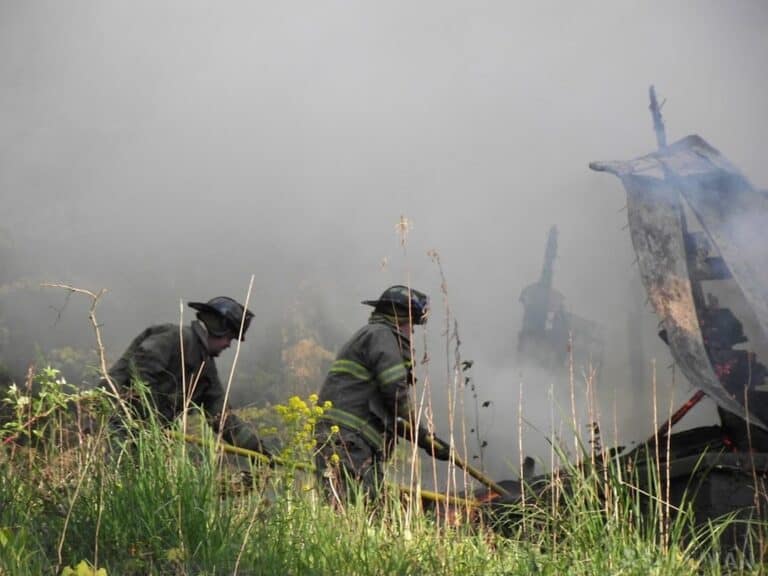
Fire
- Risk Factors: Death, loss of home and possessions, destruction of crops, loss of livestock.
- Solutions: Obtain and emplace fire extinguishers, cut fire breaks into pasture and crop land, consider small tanker truck or towed sprayer for amateur firefighting tasking.
A fire is one emergency that every homesteader fears. Whether it is a house fire when the fire department is very far away or non-existent, or a crop fire blazing across your land, both can threaten your animals and your very lives, and leave you with nothing.
You can probably already see where I am heading: when a fire sparks off it is up to you to play firefighter or potentially lose it all.
Fortunately, getting prepared to battle the average fire that will occur on a homestead is not terribly difficult so long as you can detect the fire early enough and act quickly enough to squash it. You’ll need a little know-how and the right equipment though to stand any chance.
First things first, you can protect your home by obtaining several large, properly rated and high capacity fire extinguishers and learning how to use them.
More than any other item these will afford you the best chance of extinguishing a blaze before it grows out of control into a fully involved house fire. Everyone in your home or group should know how to operate it, know where they are and practice accessing and using it.
Protecting your homestead’s crops, animals, and outbuildings against accidental or wildfire is a little more difficult but still totally achievable. Large pastures and crop grows should feature regular, dug fire breaks in order to arrest or slow any blaze moving through them.
Also, rehearse a response plan for various scenarios depending on where the fire starts. If a fire should start near an outbuilding or in a pasture or animals are kept the animals need to be rescued or an exit for them made so they may flee the fire, even if you have to round them up later.
Another common fixture on large, working ranches or farms is a small tanker truck, or even a pickup truck hauling a large sprayer tank, that holds water used for firefighting. If you act quickly you can hop in such a vehicle, drive to the location of the fire and start fighting it yourself.
Drought
- Risk Factors: Loss of crops, potential loss of livestock.
- Solutions: Install large-scale water storage system, supplement with rain catcher, stockpile food and provisions ahead of time for people and livestock.
Drought often goes hand in hand with a heat wave, but not always. The single, biggest hazard posed by drought is the loss of crops and the attendant degradation of soil due to the loss of grasses and other root systems.
If drought goes on long enough, it can cataclysmically disrupt your growing operations and also degrade your soil to the point where re-establishing a crop will be difficult or impossible.
Unless you have a weather control device, there is not much you can do to combat the conditions that facilitate drought. All you can hope to do is desperately hang on in spite of it and outlast it.
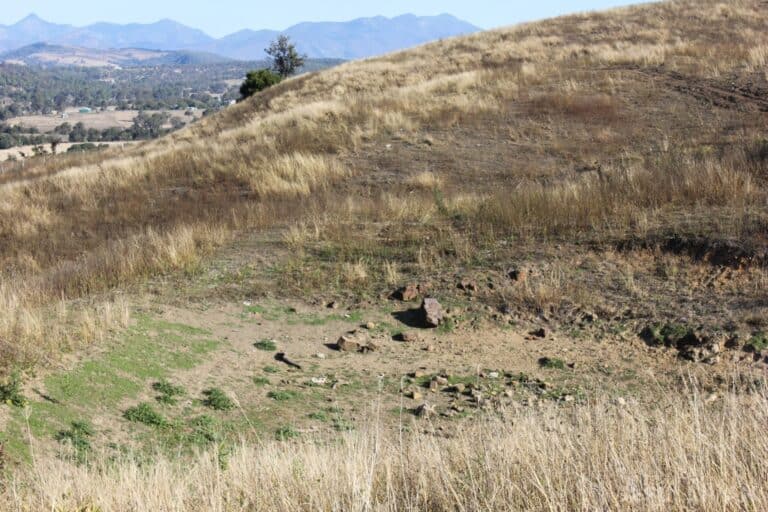
Obviously, water is going to be even more precious than it is normally on a working homestead, and you will require substantial amounts on tap that can be distributed as needed if you don’t want to lose your crop.
Setting up a jumbo water storage tank that is fed by a rain catcher system is a great way to give yourself a hedge against future drought, but it won’t do a lick of good if it is not full prior to the onset.
Also consider what you will do if you and your family or group are dependent or partially dependent on the fruits of your labors for survival.
Losing a crop to drought could mean an empty pantry and rumbling bellies down the road. The solution to that, at least, is somewhat simpler and is probably something you are already doing.
Foodstuffs and produce alike should be stored and preserved, one way or the other. Canning, pickling, dehydrating and other forms of preservation are always worthwhile, as is stocking a root cellar with fresh, live produce.
Loss of Vital Infrastructure or Services
- Risk Factors: Complications can result in injury/death, degrading health of livestock, loss of livestock, loss of productivity.
- Solutions: Educate yourself in required field, investigate and establish alternative solutions for essential requirements.
The idea of living on a homestead is to make yourself less dependent upon society. But sometimes, due to mishap or just life circumstances, you might still be forced to rely on specialized goods, services or expertise.
The most common instance in this category would be medical care in the form of veterinary assistance or even specialized treatment for yourself or a family member. Whether on a homestead or not, you must still seek out this care or have it come to you if you lack those skills yourself.
But what will you do if, for whatever reason, specialist services or skills are no longer available? Your animals will still need checkups and tending to for all manner of injuries and conditions. If you or a family member needs special medicine for an ongoing condition (say, insulin for diabetes) there is no hitting “pause” on that dosage clock.
This is where things get very dicey for people living on a homestead. Access to expertise and services might be temporarily cut off in the case of a local disaster or some other mishap, or it might be cut off for the foreseeable future in case of a societal collapse or regional catastrophe.
Planning for such an eventuality is difficult and often seems extreme, but it is nonetheless achievable in most instances.
It’s not out of the question that you or someone in your group could take it upon themselves to start learning everything they can about the subject at hand, be it care of animals, care of people, or even specialized skills like engine repair or fabrication.
Dealing with an ongoing condition managed with medication is more difficult, as virtually no one can reliably manufacture the various chemicals or replicate the processes used to produce life-saving medicines.
What you can do, however, is learn absolutely every alternative, homeopathic or “unusual” treatment for a given condition that you can, and, if possible, test such treatments for efficacy empirically before you get in a jam.
It might sound like entirely too much, and that’s understandable, but remember that living on a homestead in the first place is about embracing radical self-reliance.
Loss of Rule of Law
- Risk Factors: Loss of resources, death, or worse…
- Solutions: Protective strategy must be established, guard/lookout duty, practice and refine defensive response with family/group members.
One of the scariest scenarios facing any homesteader might well be the loss of the rule of law in the surrounding area or in the most nearby major settlement.
Understandably, many modern homesteaders take up a lifestyle because they want to get away from the chaos and pandemonium that is attendant with living in any populated area…
But, somewhat counterintuitively, in situations where the rule of law becomes frighteningly tenuous or disappears entirely, it is people living in rural or remote areas that might be most at risk of victimization.
Don’t make the mistake of thinking that roving baddies wouldn’t attack you because you “don’t have anything they want.” Think it through:
Generally, when bad guys want to do bad things they choose victims based on an “interview”, with the interview process including such factors as the victim’s capability to defend themselves, proximity to any potential witnesses, presence and likelihood of bystanders or comrades who might come to the victim’s aid, and ease of access/efficacy of escape routes.
Compared to a typical neighborhood setting or a large group of similar people that occupy one or two closely situated structures, a remote farm or homestead is easy pickings.
History has shown us time and time again that people living in outlying areas or in isolated conditions are hideously victimized, sometimes just for sport, by the rogues, thugs, and psychopaths that seem to radiate out of cities once the rule of law collapses. How will you deal with such a threat should it occur?
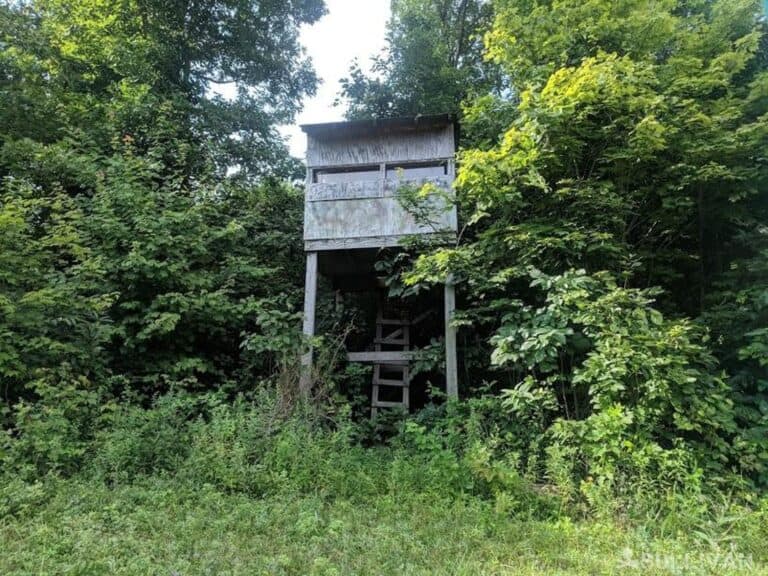
This is a tricky business, and the answer is not just having a shotgun or rifle and knowing how to use it. Protecting what is yours against a long-term, persistent threat requires manpower and plenty of guns to equip them with.
You’ll need to assess the various approaches into and out of your property, post guards or lookouts on a regular rotation, plan defensive drills and practice group responses to imminent threats.
Your homestead, too, will physically require some hardening and improvement. Building camouflaged or concealed observation posts or lookout towers might be necessary, as will be the construction of fighting positions both in your home and outbuildings, and elsewhere around your property.
Conclusion
Living on a homestead is hard work, but often produces a rewarding lifestyle and is one of the best hedges against a SHTF event that any prepper could want.
However, living well beyond the bounds of traditional society means you won’t be able to rely on emergency services and quick response times to save the day when things go wrong.
Just like every other chore and job, you’ll now be relying on yourself and your family or group to solve problems. Make sure you are prepared for the most common emergencies above.
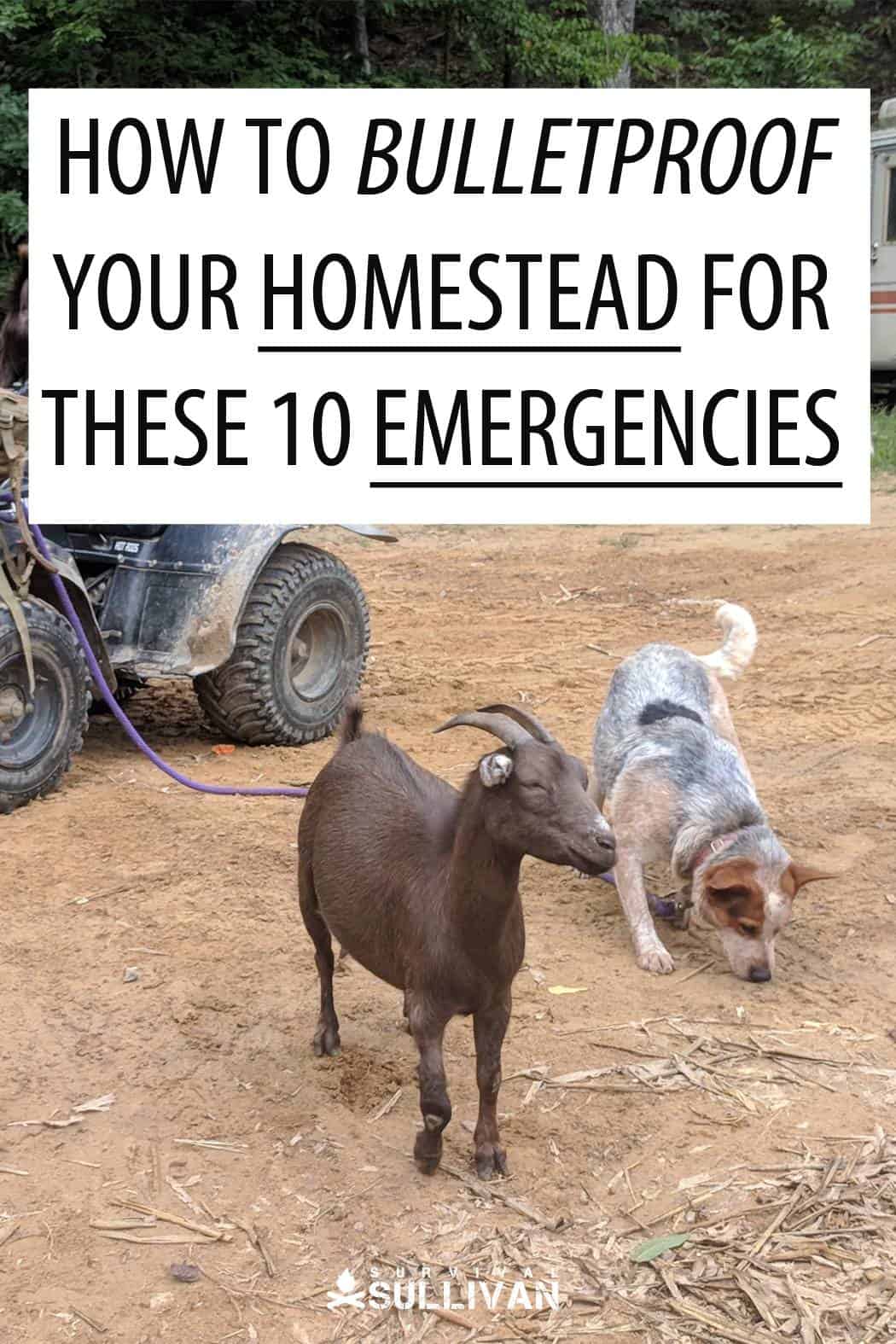

Tom Marlowe practically grew up with a gun in his hand, and has held all kinds of jobs in the gun industry: range safety, sales, instruction and consulting, Tom has the experience to help civilian shooters figure out what will work best for them.
